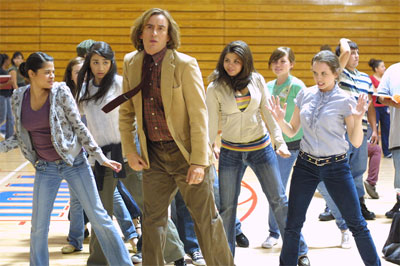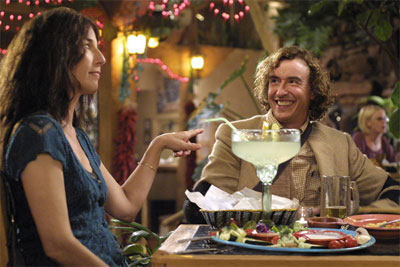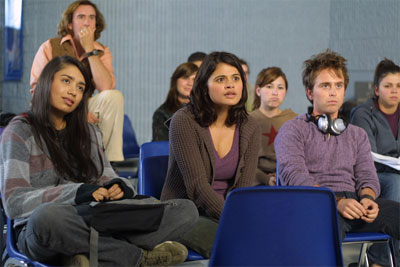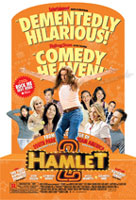Steve Coogan Hamlet 2 Interview

STEVE COOGAN ROCKS WITH HAMLET SEQUEL
EXCLUSIVE Steve Coogan, Hamlet 2 Interview by Paul Fischer.Steve Coogan's career in Hollywood has taken off in leaps and bounds. He delivers a comically explosive performance, literally, in the Ben Stiller-directed parody Tropic Thunder and plays a failed actor-turned drama teacher who combines twisted Christianity with barbarous Shakespeare in a sequel to Hamlet. Irreverant on screen, off screen, Coogan is surprisingly shy and thoughtful as PAUL FISCHER discovered when he spoke to the British actor in Los Angeles.
QUESTION: Was this character in Hamlet 2 a very irresistible character for you to play?
STEVE COOGAN: I wouldn't say - yeah. Irresistible? I was something of two minds about it. I thought it was very funny, and he was a very interesting character. Whether I had the chops to do it, as you say - whether I was capable of doing it I thought was a bit of question in my mind.
QUESTION: Why was that?
STEVE COOGAN: Well, because it's quite different from things I've done before. And movies I'd done before. I tend to play people who are not very nice, basically and Dana Marschz might be foolish and make stupid choices a lot of the time, but he's basically a nice person who's trying to do the right thing. And that's not normally what I play. So that part of me was a little nervous about it.
QUESTION: He's also a man full of the kinds of insecurities I suspect that actors go through on a regular basis. Could you identify with that facet of the character?
STEVE COOGAN: Oh, sure, sure, sure. I mean, yeah, especially when you live around that all the time, when you do what I do. So you see other people being guilty of it. I myself am sometimes guilty of it. But that's just like these inward-looking neuroses. So there's a load of stuff we've got to tap into, you know? Without doing much research, put it that way.
QUESTION: What ended up being particularly challenging, playing the character during the - I guess during the finale of the movie, where you finally have to play these kind of Shakespearean characters seriously, as it were, but at the same time, parroting them at the same time?
STEVE COOGAN: Well, that's a tough spot, the whole thing, to be honest. Is trying to do both those things. Trying to be both mocking, and playing for a laugh, and at the same time being the very thing that you're laughing at. And actually giving it some emotional truth. Trying to square those things is a tough thing, trying to get the balance right so that people care. That stops it from being - you don't want it just to be a comedy movie, and you don't want it to have one of those third acts where there's nothing funny going on, because lots of people are patting each other on the back and shaking hands and talking about life. It's all about getting the balance right.
QUESTION: You wouldn't have done this, I wouldn't imagine, if it didn't have a sense of humanity about it, would you?
STEVE COOGAN: I think you probably could have done the movie, but I don't think it would have been - it might have worked on a kind of comic level, if you ramped up the comedy. But it wouldn't have been very satisfying. I think it's possible to do a movie like that. But you want to bring something extra to it. You know, I think for me, it's what makes the film charming. It's not cynical. The film becomes like the character. The film - at first, the audience, and the film itself, is almost mocking the character. And then the film, as it were, becomes more like him. The film and he are one thing together, at the end. The characters have a similar sort of attitude. The film is the cynic, and he's the innocent, passionate - and then the film becomes much less cynical. And I love that about it.
QUESTION: How surprised are you, Steve, that your career has taken off in leaps and bounds? I mean, you've been doing this, obviously, a long time. And I know you started out doing your own stuff on television in the UK in particular. Are you surprised at how your career has kind of undergone this metamorphosis?
 STEVE COOGAN: Well, it's very difficult to say yes or no to that. You try to keep doing the same thing and you know that some things work, and some things don't. And sometimes things come along and you go, "Oh, I need this." You know, you have to find the right thing. Like most of us, I thought, "I just need the right thing to do, and I'll be able to show people how good I am." I say this slightly ironically. But there's a lot of truth in it. I always expect the worst, so it's always a bonus when things go well, because I'm so naturally a pessimist that people will like things, that it's a relief. But I can't say I haven't been trying to work, coming over here to America, trying to find projects, and do something different. And in some ways, I'm not surprised that the Americans have taken, and wanted to work with me, and collaborate with me, because there was a newness to me. And then I'm sort of part of the furniture in England a bit. So I knew that I'd have some sort of novelty value that I might be able to capitalize on, because they're not tired of me here yet.
STEVE COOGAN: Well, it's very difficult to say yes or no to that. You try to keep doing the same thing and you know that some things work, and some things don't. And sometimes things come along and you go, "Oh, I need this." You know, you have to find the right thing. Like most of us, I thought, "I just need the right thing to do, and I'll be able to show people how good I am." I say this slightly ironically. But there's a lot of truth in it. I always expect the worst, so it's always a bonus when things go well, because I'm so naturally a pessimist that people will like things, that it's a relief. But I can't say I haven't been trying to work, coming over here to America, trying to find projects, and do something different. And in some ways, I'm not surprised that the Americans have taken, and wanted to work with me, and collaborate with me, because there was a newness to me. And then I'm sort of part of the furniture in England a bit. So I knew that I'd have some sort of novelty value that I might be able to capitalize on, because they're not tired of me here yet. QUESTION: Well, do you miss British television? I mean, you've gotten so that you've been hugely successful in the UK. Do you miss where you started?
STEVE COOGAN: Not really. Because, I mean, last year I did the second of two TV series back there, which I wrote and acted in, produced for the BBC. So I've never walked away from it, really. And also, I did a series this year called Sunshine for BBC1, which I did - it's actually the last thing I did. I did it after Hamlet 2. So, I've just completed something for the BBC. So, I thought if I didn't do it, I would miss it. I do like working for the BBC, and I do like doing things on British television. It's a different television. In enables you - you can be a little more adventurous, because there are different - the stakes are different. It's a place where you can take risks. It's a safer place to take risks, and I enjoy it for that respect.
QUESTION: Do you live on both sides of the Atlantic, Steve, or are you starting to move - you moved to Ojai already?
STEVE COOGAN: I spend most of my time in Britain, and some in LA.. I spend, like, a quarter of the year, maybe a third, in LA. All told. And I like it that way. And I do like coming to work in America. I like working with different people, I like a change of scenery. One thing informs the other. And I wouldn't like one - I want to have my cake and eat it.
QUESTION: I guess you got the Tropic Thunder gig partly as a result of the first Night at the Museum. What is it about - how would you describe working with Ben both as an actor and as a director?
STEVE COOGAN: Well, that's not entirely true. Ben met me and tracked me down, because he'd seen my British stuff, and a couple of movies I'd done over there, and said that he really liked me and wanted to work with me. That was very flattering. So I think he genuinely made it clear to me that I was favored. I was favored by the king! And so I think he sort of - we talked during a few projects, and he just said he might want to - you know. And then these things were just coming along. I think he started to think what Steve Coogan might be appropriate for, in those two things. Working with him an as actor and director? As an actor, he's very enjoyable to work with. He's a very funny person, very good company. He's very intense as a director, though. Very, very exacting. Very, very - knows what he wants. But then he also is quite picky with which actors he works with. So. The fact that you're - if you're there shooting with him, you know you've already achieved something. Because he doesn't suffer fools gladly, I think is a euphemism. But he is a total perfectionist. And the results of that are plain to see. But he's someone who raised my game. He chooses you because he likes you. But just because he likes you doesn't mean he's just gonna let you do - you know, he really pushes you, whoever you are, you know? So that all the actors, he would make them crank it up, or just squeeze that extra bit of stuff out of your performance. And, yeah. I would work with him again at the drop of a hat.
QUESTION: Are you still shooting Night at the Museum II or have you done your bit already?
STEVE COOGAN: No, no. I'm about to do it, in September.
QUESTION: Do you think the film is going to be dramatically different from the first one?
 STEVE COOGAN: Well, I've seen the script, and it's the same, but different. It's got enough to satisfy people who liked the first one, but there's more happening, and there's more - it's more poetic than the first one. There's some great moments, and some great set pieces.
STEVE COOGAN: Well, I've seen the script, and it's the same, but different. It's got enough to satisfy people who liked the first one, but there's more happening, and there's more - it's more poetic than the first one. There's some great moments, and some great set pieces.QUESTION: Now, you've just finished working with Jonathan Glatzer, Safety, which strikes me as being a tad different from some of these other films. How would you describe the character of Campbell that you play in that?
STEVE COOGAN: How would I describe him? As a lost soul, I guess. Lost, dysfunctional, damaged person. I'm used to playing damaged people, but normally they're in comedy. So the damaged part wasn't a complete novelty to me. The guy who's got issues is something that I'm always playing. Yeah. So, this guy was one of these dysfunctional, unhappy people, who somehow learns something about himself through a very circuitous, unusual route. And it was very dramatic. I kind of like to do that, occasionally. It's not that I - but my first love is comedy. But I do like experiments, you know? And working with Jonathan was a great experiment. I have no idea what the movie's like. But yeah, it was a great education.
QUESTION: How about working with James Gandolfini in In the Loop?
STEVE COOGAN: I did one day on that. I never met him. I did a one-day shoot. I'm on IMDB for that movie, I'm surprised I am. I just did that as a kind of a favor to a friend, and I'm in a few scenes. But all that stuff was shot in New York, and mine was shot in London.
QUESTION: And you're reteaming with Michael Winterbottom.
STEVE COOGAN: Yes, I will reteam with Michael Winterbottom. I'm not quite sure what I'm doing, but I am gonna work with him again, for sure. Yeah. And we're talking about what it is we're gonna do. But there's nothing specific, and whatever you might have read on-line is just not accurate, but we haven't decided what we're gonna do.
QUESTION: What kind of influence do you think Michael has had on your career?
STEVE COOGAN: A big influence on my career, in terms of the way people perceive me. And also, in terms of what I've learned as an actor through working with him. So it's twofold. He's sort of helped me broaden my horizons, in terms of media perceptions of me, and certainly stopped me being pigeonholed, working with him. And that's opened up new avenues for me, in terms of collaborating with people on more interesting stuff. So I'm always grateful for that. but he also taught me - I learned a lot from a technical standpoint, of learning to not be totally in control of something. Because he has a strange way of working, which is - I couldn't do it by myself. But working with him, I quite like. There's a kind of chaos to what he does, but it results in something quite beautifully crafted and interesting in a strange way that I don't quite understand, but it's fun.
QUESTION: Were you always interested in acting as a kid, or were you more interested in being the focus of attention, and making people laugh?
STEVE COOGAN: I wasn't really the class clown. I didn't sort of want to be the focus of attention, really. I was more of a day dreamer, someone who escaped in TV and movies and stuff like that. It's the place I went to escape in my mind. It wasn't really that I wanted to be the guy saying, "Hey, get a load of me." But I did like to fantasize and go off and be different characters and things. It was more a way of escaping, rather than a way of getting attention.
QUESTION: Did you ever think you would pursue acting as a profession?
STEVE COOGAN: Yes, I did.
QUESTION: Why?
STEVE COOGAN: Because when I did funny stuff, people would say, "You should be on TV. You should be on TV. You should be on TV." And then I thought - well, I kind of had this lightbulb moment when I realized when I was 18 - 17 or 18-- I think I thought that there had to be a new generation of people that will emerge one day. And that they are as yet unknown. And if I play my cards right and did the things I was supposed to do, I could be one of those people.

MORE
- Viggo Mortensen The Road
- 24 Cast Reunion
- Aaron Eckhardt No Reservations
- Aaron Eckhart The Dark Knight
- Adam McKay Step Brothers Interview
- Alan Alda Diminished Capacity Interview
- Alan Alda Diminished Capacity Interview
- Alex Dimitriades
- Al Pacino Oceans 13
- Alan Rickman Snow Cake
- Alan Rickman Sweeney Todd
Copyright © 2001 - Female.com.au, a Trillion.com Company - All rights reserved. 6-8 East Concourse, Beaumaris, Vic 3193, Australia.



